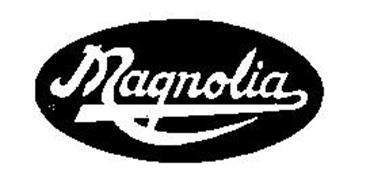Magnolia is a Philippine ice-cream brand whose origins clearly go back to the 1920s. It has belonged to the San Miguel Corporation for most of its history.

IP Philippines Registration No. 42004005904
San Miguel Corporation, Philippines
Source: World Intellectual Property Organization
In the 1970s, a completely unaffiliated Filipino American family in Northern California started marking their own ice-cream products with the “Magnolia” name in order to surf on the goodwill that the original Magnolia had developed among Filipinos from the old country. (This assertion was voiced by U.S. federal judge Richard Clifton himself during oral arguments in Case No. 13-55537.)
The Filipino American family Quesada, operating as the Ramar company, filed a trademark application in the early 1990’s claiming the Magnolia mark for their exclusive use in the United States, based on their use of that name and logo for decades. The fact that San Miguel had been using the Magnolia name and logo for much longer in the Philippines and was the originator of that brand name was irrelevant under U.S. law.

USA trademark serial number: 74297882
Ramar Foods, California, USA
Source: Trademarkia
To this day, many Filipino Americans assume that the Magnolia ice-cream they eat in the United States is related to the Magnolia in the Philippines. It is not.
The U.S. brand name and company logo are strikingly similar to the homeland’s original, but it is California’s Ramar Foods, and not the Philippines’ San Miguel, that’s profiting. Ramar’s rationale behind the appropriation is that San Miguel “did not have the vision to know they could sell to Filipinos here.” In effect, brand-name piracy is considered smart business sense in the United States. It may be unethical, but it’s legal.
In 2005, the Wall Street Journal focused on this particular brand-name piracy issue, in which companies in the United States appropriate trademarks from overseas. The article noted that the trend has been buoyed by U.S. immigrants who favor buying the traditional brands they cherished in their home countries. Not surprisingly, these consumers are quick to assume that a product in the U.S. with a name from home is the product they grew up with. In this case, it is not.
There have been many legal cases involving Ramar vs. Magnolia, including Ramar’s recent efforts to prevent San Miguel from selling Magnolia butter, margarine, and cheese in the United States. It is a classic example of using U.S. law to bully a non-USA company, and even the judges in the Ninth Circuit Court of Appeals in California appear to recognize it as such. The panel’s decision is expected to be formally issued in mid-2015.
Outside the courts, in the arena of public opinion, Ramar has been vigorously supported and promoted by Filipino American food bloggers who have received funding from the company.
San Miguel’s victimization is recognized by Philippine-born Filipinos who grew up eating the original Magnolia in the Philippines and who have regularly witnessed many facets of their heritage being appropriated by outside forces. They do not need to be paid money to recognize the inequity in the situation.
There has never been a licensing agreement between the U.S. company Ramar, which started using the Magnolia trade dress in the 1970s, and the Philippine company San Miguel, which had developed the Magnolia brand for many decades earlier.
Sources and Further Reading:
San Miguel battles Magnolia trademark holder to sell in US (2012)
The San Miguel Group is battling a Filipino-American food manufacturer in California, which had beaten it in securing an identical Magnolia trademark in the United States.
Ramar Foods opposed the application of San Miguel Corporation to register the mark Magnolia for ice cream (1991, 1993)
Magnolia Ice Cream: Ramar Foods versus San Miguel Corporation (Storify)
In 2000, the Philippine Islands’ largest conglomerate, San Miguel Corp., lost a long legal fight to stop a California company, Ramar Foods, from selling Magnolia ice cream, a brand San Miguel owned. From its Oakland factory, Ramar produced flavors that were nearly identical to Magnolia’s — lychee, avocado, corn-cheese and ube — and used packaging and logos very similar to the Filipino company’s. However, there has never been a licensing agreement between Ramar and San Miguel. Ramar was able to get away with making profits off Magnolia’s trade name and trademark logo, because Ramar had filed an application for those in the United States and asserted that it had been using that name and logo for decades. The fact that San Miguel had been using the Magnolia name and logo for much longer in the Philippines and was the originator of that brand identity was irrelevant under U.S. law.
Don’t Sit and Wait: Stopping Trademark Squatters
San Miguel was founded in 1890 and is one of the Philippines’ most diversified conglomerates, with a workforce of over 15,000 generating close to three percent of the country’s gross national product. The company is perhaps best known for San Miguel Beer, its flagship product, which is among the top ten beer brands in the world. One of San Miguel’s better known brands is Magnolia, its dairy product subsidiary. From its start in 1925, Magnolia branded ice cream was one of the most recognizable and enduring brands in the Philippines and is the oldest Asian ice cream.
Transcript: Ramar International vs. San Miguel Pure Foods (2015)
Ramar’s lawyer insinuates before the court that San Miguel will be selling “moldy cheese” under the Magnolia brand in the United States. Though repeatedly being reminded that product quality is of no relevance to the legal points being debated, Ramar’s lawyer keeps sneaking in the innuendo that products made by San Miguel, a major Philippine company with a long history of consumer trust in Asia, are inferior.
UPDATE:
SAN MIGUEL PURE FOODS CO. V. RAMAR INT’L CORP.
Date: August 27, 2015
Docket Number: 13-55537
Butter, Margarine and Cheese (BMC) issue
The court reverses the injunction entered in favor of Ramar and affirms the balance of the judgment in favor of San Miguel.
